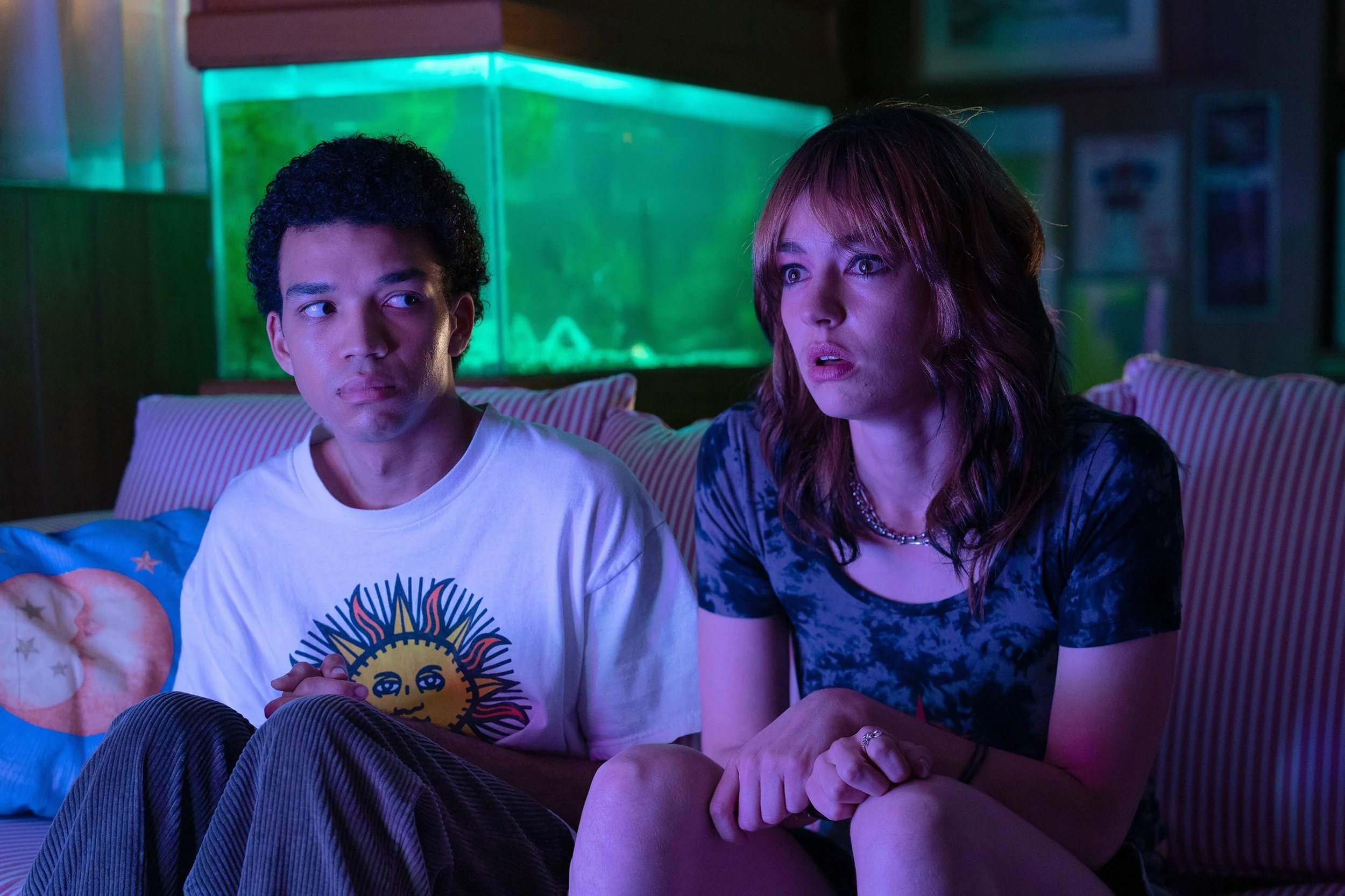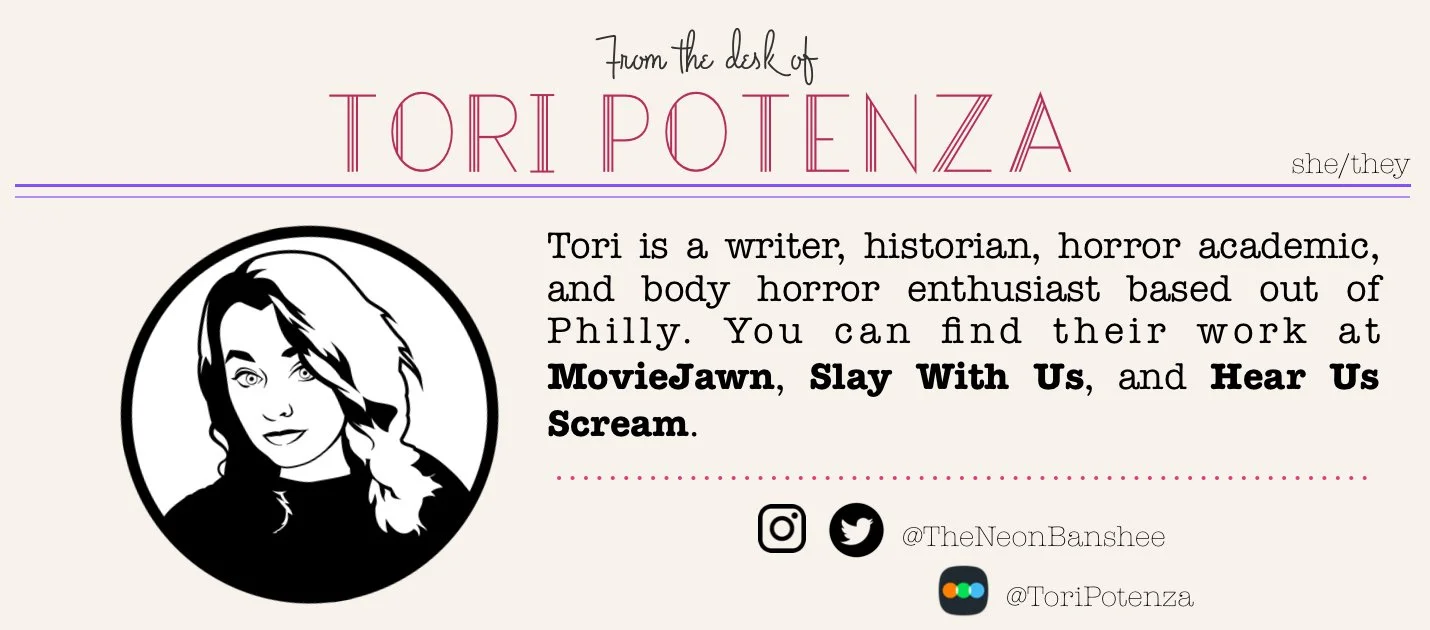I SAW THE TV GLOW connects us all through our own dissonances
I Saw the TV Glow
Written and Directed by Jane Schoenbrun
Starring Justice Smith, Brigette Lundy-Paine, Ian Foreman, Helena Howard
Rating PG-13
Runtime 100 minutes
In theaters May 17th
by Tori Potenza, Staff Writer
I know it’s scary, that’s part of it.
First off, let me just say, I had a deeply personal experience watching I Saw the TV Glow. It is hard to think objectively about a film when it feels like the movie seeps into you as you are watching it. The themes of I Saw the Tv Glow feel equally personal and universal. And if your formative years were the early 2000s there is even more of a chance that this will resonate. When I saw this at SXSW in March I remember feeling that the combination of themes, visuals, performances, and music created a language with a message that I needed to hear. I liken the experience to the first time I saw Videodrome. But that is the beauty of films, and art in general, sometimes it just clicks in a way that words cannot adequately describe.
There is something both dreamlike and nightmarish about I Saw the TV Glow. It taps into the unconscious, reaching into those deepest desires, loves, and needs that the ego makes us think are unimportant as we grow. If you grew up around the time of the lead characters Owen (Justice Smith) and Maddy (Brigette Lundy-Paine), shows like Buffy, So Weird, or magical girl narratives made us dream of a special life outside the mundane suburbs. They offered a powerful and intoxicating idea that there was more out there than the lives the adults around us chose. Which is why it is so easy for Maddy and Owen to become drawn into The Pink Opaque, a show about two magical girls fighting against evil. The entrancing effect the show has on the main characters is the exact same effect that Schoennbrun’s film has on its audience.
If you ever felt like an outsider growing up, you may have found solace in media that could sweep you away to another world, and that was a powerful sensation. I remember feeling that if I imagined or willed it hard enough I could be one of these magical people, these chosen ones. I would awaken with powers, a secret witch's coven would be revealed to me, or I would receive an invitation to a school for magic users. Anything that offered a way out. But this is especially prevalent for those who grew up questioning their sex and gender identities. We often feel different. We did not always see ourselves represented in our communities or in the media we consumed. So we get swept up in the stories of others who are different and the ways find power in those differences. Jane Schoenbrun taps into a powerful adolescent feeling, one that some of us may have even forgotten way back when as we try to conform to adulthood.
With their first feature We’re All Going to the World’s Fair, Schoenbrun tapped into a very specific time and place to reveal the intoxicating nature of early internet culture, and does something similar here with television nostalgia. While other films try to emulate nostalgia from a certain time with a deluge of references, slang, clothing, etc. Schoenbrun is able to emulate the actual feelings around these times; the loneliness, the urgency, the bitterness, the beauty. Their keen visual eye and incredible writing and direction drops you into a new but familiar world because in one way or another we’ve known these feelings even if we are far removed from them.
Every part of this movie is so beautifully constructed. The cinematography is impeccable and utterly breathtaking at times. The scenes from the television show look so much like the shows we would have watched growing up then. There is a particular scene at a club that is a perfect nod to the cool hometown clubs in shows like Buffy and Twin Peaks that we longed for in our own towns. They are dreamy and surreal and the performances entrancing. So far, Schoenbrun has given us two meaningful and unique features with an incredible amount of world building steeped in unspoken but powerful emotions. They are truly one of the most exciting filmmakers of our generation.
It is also essential to highlight the cast. Justice Smith is such a diverse actor and his performance in this is so gorgeously heartbreaking. There is a trembling fear beneath everything, and even his eyes constantly give away the fear he dares not speak about. On the other hand, Ian Foreman plays young Owen with a beautiful excitement and energy that reminds us of the spark of youth and discovery. Brigette Lundy-Paine’s performance as Maddy whisks you away and makes you believe in the magic they see. When the camera focuses on them it is almost impossible not to be pulled into their chemistry. Combined the two are so expressive and so much comes through their performances beyond their dialogue.
This is such an impressive horror movie because the horrors here are so human–those unconscious and existential fears that we oftentimes do not know how to express. The fear of returning to the things we loved when we were young to find the magic is no longer there, the fear of becoming just like “everyone else,” or the fear of waking up and realizing that “this is it.” Ultimately, it comes to the dread of what happens when we let our soul and spirit die and let conformity take over. It is so utterly terrifying there were times I could not catch my breath. The last twenty minutes of the film I was clutching my chest waiting for the tension to release. Yet there are just as many gorgeous moments as there are dreadful ones. There is also a sense that it is not too late. Even if we are adults sucked into modernity, maybe our soul isn’t quite dead yet, there is still time.


